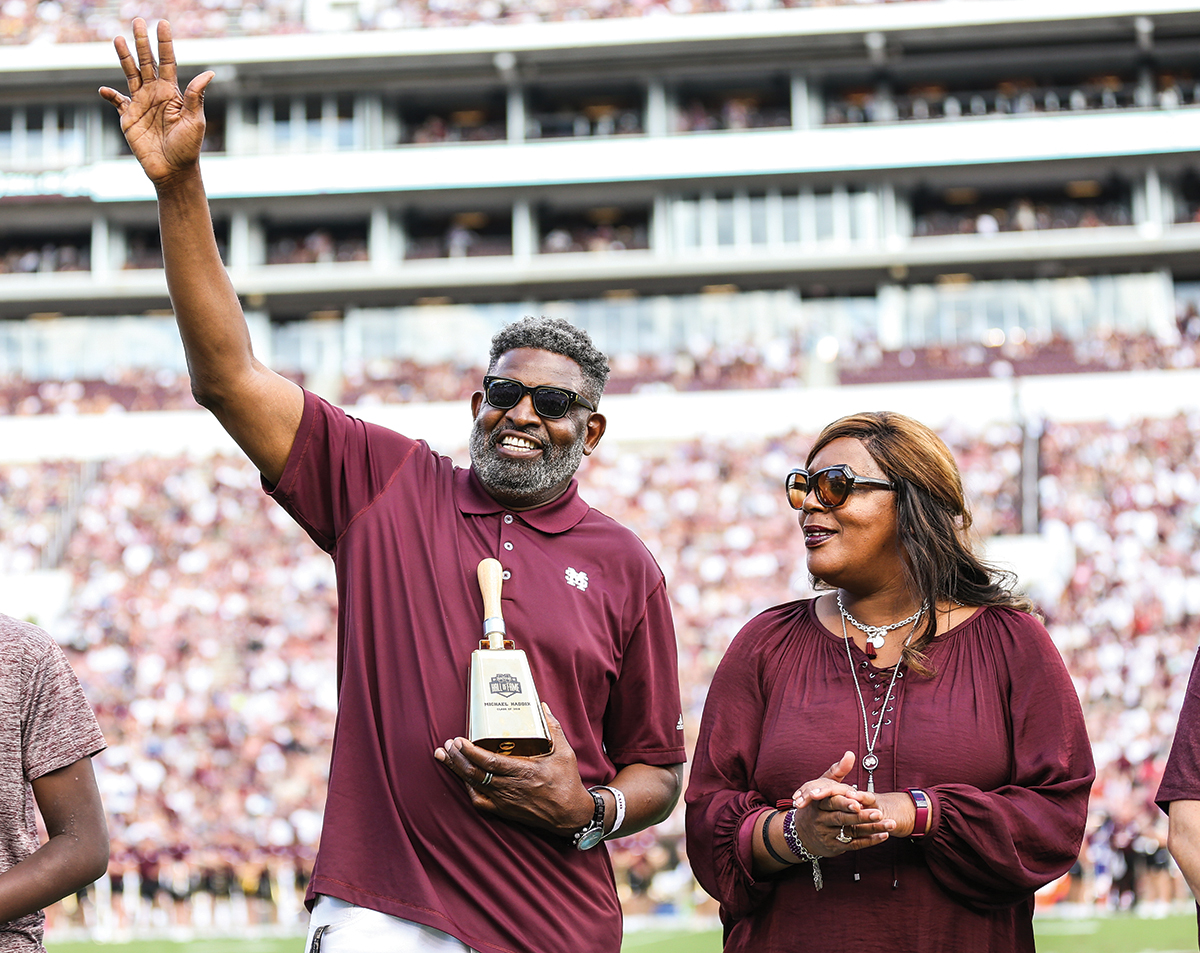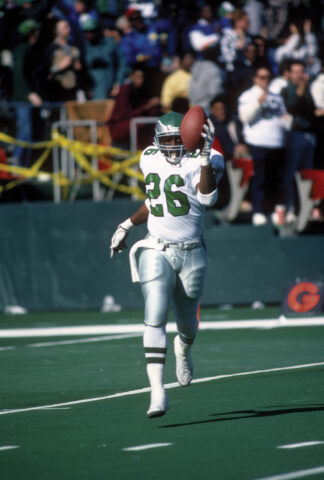A Gentle Giant: Michael Haddix

A master’s from WilmU influenced this former Philadelphia Eagle’s lifetime work. Now the ex-fullback is fully invested in his community.
When Michael Haddix was 9 years old, he suffered a child’s worst nightmare: His parents, as well as an aunt, were killed when their car was struck head-on by a drunken driver as they were coming home from a high school reunion.
It happened on Christmas Eve. Three days before his 10th birthday.
That kind of devastating tragedy can lead to a textbook full of emotional struggles for a child —unless that child has a strong support system. Fortunately, young Michael did.
His maternal grandparents, Devoe and Ruby Rainer, took him in, along with his 13-year-old sister and his infant sister and brother. “There was never any question of us going into foster care,” Haddix says.
He and his siblings joined his aunt’s children and his grandparents’ children, who were in high school, to make a total of 14 kids on the Rainer farm.
It was a big farm near a small town — Walnut, Mississippi (population in 2010: 717). “We had milking cows, raised hogs, chickens, we chopped cotton, grew corn, cucumbers, peas, even had horses,” says Haddix. “One thing we knew about was hard work.”
Thanks in part to the day-long demands of farm life as well as loving adults to guide him through his formative years, Haddix says he never got into the mischief so common to adolescent boys. “I was always a kid who worked hard and was a good student. I was disciplined.”
For that, he says, his father was at least partially responsible. “My dad was only with me for nine years of my life, but I think everything that he ever taught me I remembered. Then my grandfather and grandmother picked it up from there.”
He also was well aware of how fortunate he was, as an orphan, to have a stable home life. That awareness would shape his career choices, eventually bringing him to what was then Wilmington College, where he earned a master’s degree in Administration of Human Service, with a focus in the juvenile justice system and at-risk children.
He explains his educational choice this way: “Anytime you come through what I went through, you want to give back to kids who are less fortunate.”

Haddix graduated from Walnut High School in 1979 with a desire for a college education instilled in him by his grandmother. His exceptional athletic ability helped him fulfill that desire with a four-year scholarship.
“My true love was basketball,” he says, “and I got offers, but I was only 6-2 and a power forward and I figured I was too short to play power forward in college.”
That left him with football. Big, fast and country strong, he terrorized opposing defenses from his running back position. Although Walnut High — with a graduating class of 45 — was hardly a gridiron powerhouse, Haddix caught the attention of several schools and wound up accepting a full ride to Mississippi State University, in Starkville.
Losing his parents and the long, hard days on the farm had combined to forge a mature young man, and that helped him in the classroom, where he earned a degree in Elementary Education, as well as on the football field, where he averaged six yards a carry — still an MSU record — and was twice named to the All-Southeastern Conference team.
Haddix’s journey to Wilmington College can be traced to the 1983 NFL draft, when the Philadelphia Eagles picked him in the first round (eighth overall). He went on to play six seasons with the Eagles, usually as the starting fullback, before finishing the last two years of his career with the Green Bay Packers.
“I loved Philadelphia,” Haddix says.
He especially appreciated Head Coach Marion Campbell, who drafted him ahead of some big-name players, telling him he had “the size, the speed and the toughness” to eventually replace star running back Wilbert Montgomery, who was near retirement.
During his Eagles career, Haddix earned the nickname “Giant killer” from Buddy Ryan, who succeeded Campbell in 1986. Ryan habitually mispronounced players’ names, and he usually called his fullback “Maddix.” Explains Haddix: “I was pretty much the only one who could block (All-Pro New York Giant linebacker) Lawrence Taylor, and Buddy said, ‘Yeah, that Maddix kid, he’s my Giant killer.’”
Taking on the unglamorous role of a blocking back helped his image with the Eagles faithful. “The fans were always good to me,” Haddix remembers. “I think they appreciated a blue-collar guy, a hard worker.”
He retired in 1991, then accepted a job at a residential facility for youth in Mount Holly, New Jersey. He also joined his wife, Yulanda, to help her in a program in Camden, New Jersey, that focused on rehabilitating former gang members.
Helping youth was his “passion,” Haddix says. “I also wanted to try to dispel the myth that all football players could do is coach or teach. So I went in a total different direction, and I loved it.”
While working with troubled youth for several years, Haddix also became something of an entrepreneur. “I got into the tailoring business,” he says. “We would tailor suits for professional athletes. We would go all over — Chicago, Washington, wherever — and measure these guys and they would order five or six suits at a time. It did real well.”
After a few years in the workforce, he felt the need for an advanced degree. He researched nearby colleges and decided to continue his education at Wilmington. “I lived in Washington Township, New Jersey, so it was close,” he says, “and I had heard good things about the school. It was a nice, quiet place where I wouldn’t be distracted.”
“People were really about business there,” he adds, referring to adjuncts who were actually working in his chosen field. “I enjoyed all my classes and my professors.”
He received his degree in 2009.
Today, Haddix and Yulanda live in Starkville, where they are both fully invested in the community. Haddix has established the Professional Football Players Charitable Foundation, of which he is president and C.O.O. He says the nonprofit deals largely with “behavior modification in adjudicated youth.”
Yulanda Haddix became president of the Oktibbeha County chapter of the NAACP in January of last year. In a story on her election in The Dispatch, the local newspaper, her predecessor, Chris Taylor, said: “She and her husband really want to give back. I think they’re going to be a great team because her husband is really involved in some of everything in the community.”
Haddix also has retained an entrepreneurial spirit. Together with his wife, he owns Big Dawg’s Station 26 (his jersey number), which he calls “a country store.” Customers can fill their gas tanks, buy bait, and feast on barbecue, catfish sandwiches and Yulanda’s caramel cake.
Haddix is proud of his seven sons and two daughters, all of whom are successful. One son, Tajee Almon, played basketball for WilmU from 2012–17, and still holds the single-game record for blocks — nine. Another son, Michael Jr., is founder and CEO of Empower3d, which provides athletes with financial advice and a network of experts to support the next chapter of their careers.
Last fall, Haddix was inducted into the Mississippi State Sports Hall of Fame. In his speech, he said he viewed the honor as an acknowledgement that he was more than a football player.
“I am being recognized not only for the talent I brought on the field but for my character and demeanor off the field as a student-athlete,” he said. “That is one thing I don’t think people realize: You are not just an athlete. You are a role model, and you influence a lot of young people.”
Michael Haddix understood this maxim at an early age, and he has lived his life accordingly.



